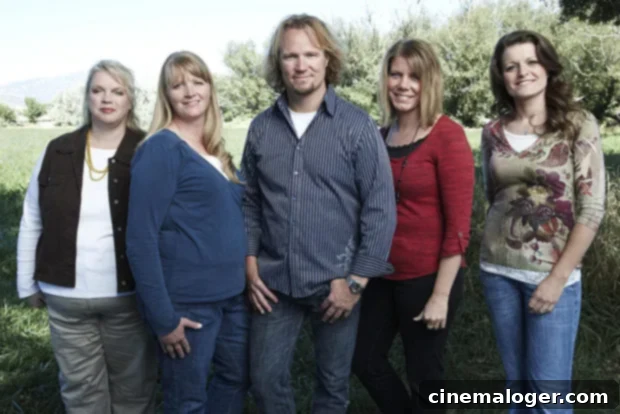Sister Wives: Meri Brown’s Unwavering Loyalty to Kody as Patriarch Amidst Marital Collapse
The complex and often tumultuous relationships within the Brown family, central to the hit TLC series Sister Wives, have captivated audiences for years. At the heart of much recent drama is the deteriorating state of Meri Brown’s marriage to Kody Brown. Despite enduring years of emotional distance, a notable lack of intimacy since her highly publicized catfishing scandal in 2015, and Kody’s increasingly vocal disinterest, Meri has maintained a surprising perspective on her husband’s role within their plural family structure. This deeply rooted conviction came to light during the revealing one-on-one interviews featured in the December 18 episode of Sister Wives, where Kody’s controversial comments about running a patriarchal household sparked intense debate among his wives and viewers alike.
Kody’s assertion of a desire for a more patriarchal family dynamic arose in the wake of Christine Brown’s groundbreaking decision to leave the marriage and the family entirely. Reflecting on Christine’s departure and the escalating tensions, Kody admitted in his one-on-one segment, “At that moment, I’m like, I screwed this up. I should’ve been more patriarchal. It’s a dumb idea, I realize, but in the moment, I’m going like, ‘Ladies, she wouldn’t be leaving and we wouldn’t be having these problems during COVID if I would’ve just been the head of the family.’” This statement unveiled Kody’s belief that his failure to assert absolute authority led to the family’s fragmentation, a sentiment that resonated differently with each of his remaining wives.
Meri Brown’s Enduring View of Kody as Family Patriarch
When host Sukanya Krishnan directly posed the question to Meri in her own one-on-one interview – whether she still viewed Kody as the head of the family – Meri’s response was unequivocal: “I absolutely do.” This affirmation, coming from a woman whose marriage to Kody has been largely non-existent for nearly a decade, underscored a complex interplay of personal belief, loyalty, and perhaps, a lingering hope for what once was. Sukanya pressed further, asking Meri to clarify if this meant she subscribed to patriarchy. Meri confirmed, “Yeah. But I also am a strong, independent woman and I can do whatever I want. [Is Kody] going to support me in that, as well? It’s looking like those maybe [don’t fit in the same puzzle].” This introspective moment revealed Meri’s internal conflict: a deeply ingrained belief in a patriarchal structure, yet a fierce desire for personal autonomy that often clashes with Kody’s rigid expectations. Her words hinted at the fundamental incompatibilities that have plagued their relationship, suggesting that her acceptance of Kody’s authority doesn’t automatically translate into Kody’s acceptance of her individuality.

Meri’s steadfast adherence to Kody as the family patriarch, even when her own role within that patriarchy seems diminished, speaks volumes about her traditional upbringing within a fundamentalist Mormon faith that often emphasizes male headship. It also highlights her personal struggle to reconcile her deeply held spiritual convictions with the harsh realities of her emotionally bereft marriage. For many viewers, Meri’s continued loyalty appears paradoxical given Kody’s open declarations of not considering himself married to her. Yet, for Meri, this belief may represent a last bastion of hope, a framework through which she tries to understand and navigate her increasingly uncertain future within the Brown family.
Janelle Brown’s Resolute Rejection of Patriarchal Demands
In stark contrast to Meri’s perspective, Janelle Brown expressed absolute disapproval of a patriarchal lifestyle, especially Kody’s sudden pivot towards such an authoritarian stance. Janelle, known for her pragmatic and independent nature, articulated her frustration: “Now, all of a sudden, his tune is, ‘I’m going to be the head of the household and if you don’t agree with me you can’t be around me.’ He’s like, ‘Plural marriage is standing in the way of my personal progress.’ He said that to us one time. Maybe he doesn’t want to do that anymore. Maybe he wants it to be simpler and easier. He’s changed his tune.” Janelle’s statements underscore a fundamental shift in Kody’s approach to their plural marriage, moving away from a collaborative model towards one of unilateral control. This change, she argues, directly contradicts the foundational principles upon which their family was built.
Janelle’s deep-seated frustration stems from her perception that Kody has completely abandoned the original vision of their plural marriage – a partnership where the wives collectively worked together with Kody to raise their large family. “The way he wants his relationship to look [is what he has with Robyn],” Janelle insisted, clearly indicating that Kody’s evolving desires were primarily influenced by his relationship with his fourth wife, Robyn Brown. “That’s not how we initially set it up. We were going to work together as a team to raise this family. That was our main goal. There weren’t conversations like this about how he’ll be in charge for decades. And now, the last few years, it’s like he wants his life to look more like that.”
This dramatic shift in Kody’s philosophy has had profound consequences, particularly for his relationships with Janelle and Christine. While Christine chose to exit, Janelle has found herself increasingly marginalized, her voice and perspective seemingly unheard. Her lament highlights the devastating impact of Kody’s favoritism and his desire for a more submissive wife. Janelle continued, “From what I see from the outside, it looks like Robyn is willing to live that way and that’s great if it works for them. It feels like it would feel nice if I had a husband who would see MY perspective as much as he seems to see Robyn’s.” This poignant observation not only reveals Janelle’s feelings of neglect but also casts a critical light on the dynamics of Kody’s relationship with Robyn, suggesting that Robyn’s readiness to conform to Kody’s patriarchal ideals has solidified her position as his favored wife. These irreconcilable differences ultimately led to Janelle and Kody confirming their separation in previews for subsequent one-on-one specials, marking another significant fracture in the Brown family’s plural marriage structure.

The Fading Hope for Meri and Kody’s Reconciliation
Amidst the broader family upheaval, Meri’s personal journey reached a critical juncture as she seemed to finally acknowledge the dire state of her relationship with Kody. A pivotal moment arose when she was confronted with a clip from earlier in the season, where Kody candidly revealed that he no longer considered himself married to Meri and, quite shockingly, wouldn’t care if she sought companionship elsewhere. This blunt admission, delivered by Kody directly to the cameras, was a devastating blow to Meri, who had publicly held onto hope for reconciliation for years. Meri disclosed that she had even approached Kody about publicly acknowledging their “not married” status, but he declined, citing fear of judgment from their community and the show’s audience. This resistance from Kody further highlighted his unwillingness to define their relationship, leaving Meri in a painful limbo.
A glimmer of hope, however fleeting, emerged during the one-on-one when Meri discovered Kody had actually considered reconciling with her during their last anniversary in April 2021. This fleeting thought was apparently triggered by Meri making him her famous rice krispie treats – a gesture Kody found surprisingly affecting. “The expression was sweet and the mood I was in was the right mood to try and think about reconciliation,” Kody admitted, suggesting a brief moment of softening on his part. “I was willing to see the error of my ways and then work to determine whether we were good with each other anymore.” This revelation offered a tantalizing, albeit brief, glimpse into Kody’s internal thought process, indicating that some part of him, however small, still considered the possibility of repairing their broken bond.
Yet, according to Meri, these hopeful feelings from Kody did not extend beyond the evening of their anniversary. She recounted a heartbreaking interaction that occurred when the cameras were off, an incident that vividly illustrated the profound emotional chasm between them. “I put my arms around him and I said, ‘What would you do if I kissed you right now?’” Meri revealed. Kody’s response was physically and emotionally distant: “He was physically… a board. He was backing up. He’s like, ‘I can’t do that.’” This deeply painful rejection cemented Meri’s understanding of the insurmountable barriers in their relationship. While she found some comfort in knowing Kody had considered reconciliation, she sorrowfully concluded, “It makes me feel good that he was considering [reconciliation], but it didn’t last through the evening, I guess. I would be open to it, though.” Meri’s continued openness to reconciliation, despite overwhelming evidence of Kody’s detachment, speaks to her enduring commitment to her vows and her faith. The conversation, and the future of Meri and Kody’s fractured marriage, was set to continue in the subsequent episode of Sister Wives, leaving viewers to ponder the ultimate fate of their decades-long union within the crumbling plural family dynamic.
The Crumbling Foundation of Plural Marriage
The narratives of Meri, Janelle, and Kody in these one-on-one interviews paint a stark picture of a plural marriage under immense strain. Kody’s belated desire for a patriarchal structure, his perceived favoritism towards Robyn, and the emotional abandonment of Meri and Janelle have led to the disintegration of a family unit that once proudly showcased its unique lifestyle. Christine’s departure was the first crack, Janelle’s separation created a gaping fissure, and Meri’s prolonged emotional suffering highlights the deep-seated issues that have festered for years. The traditional ideals of plural marriage, particularly those emphasizing cooperation and equality among wives, appear to have been irrevocably altered by Kody’s evolving demands and the individual wives’ struggles for autonomy and respect.
The fundamental conflict between Kody’s desire for absolute control and his wives’ independent spirits has become the central theme of recent seasons. While Meri clings to a fading hope, perhaps out of a deeply ingrained sense of duty or a spiritual conviction, Janelle has definitively rejected a future under such terms. The emotional toll on all parties, especially the wives who have dedicated their lives to this unconventional family, is palpable. As Sister Wives continues to document these profound shifts, it offers a raw and often painful look into the complexities of love, faith, and autonomy within a family structure that is rapidly redefining itself. The future of the Brown family, once a testament to plural marriage, now stands as a poignant example of its inherent challenges and potential for profound heartache.
